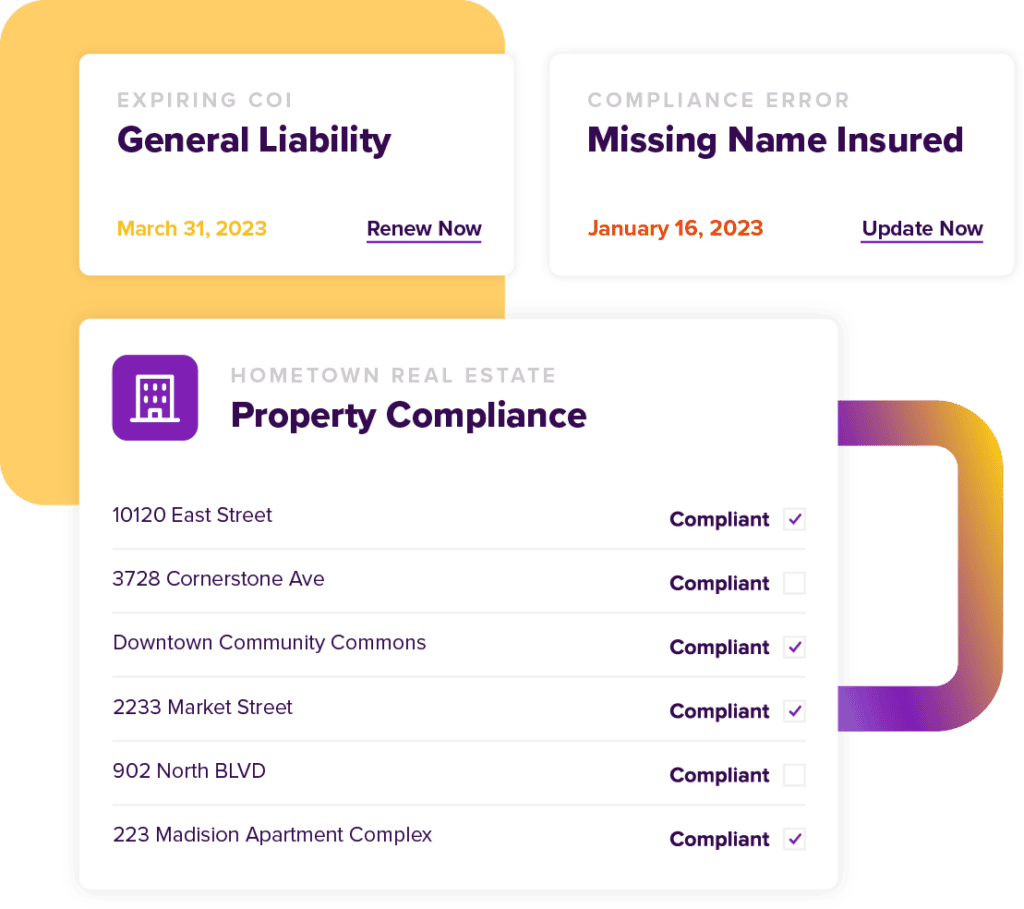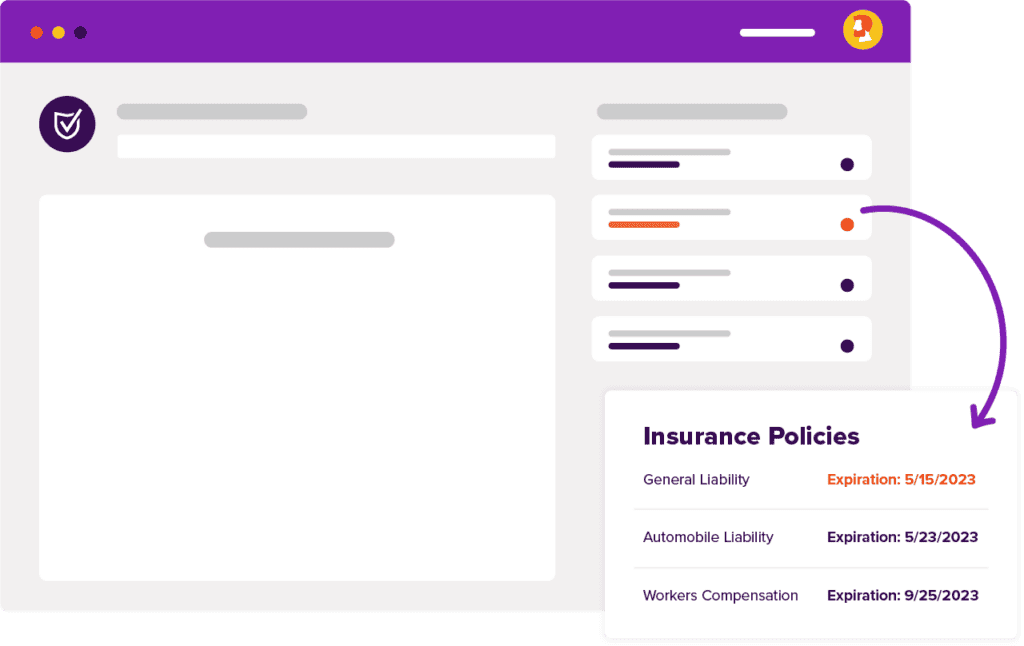Best Certificate of Insurance Tracking Software

Protect Your Business From Costly Claims
Ask your CFO or Risk Manager just how much claims and lawsuits can cost your business. If you are collecting certificates just to confirm they were received, you have no guarantee that your requirements are being met. myCOI Central is built on a foundation of insurance industry logic to ensure you remain protected with the appropriate coverage.
Automate Your COI Tracking
There’s no more need to worry about stacks of certificates cluttering up your office or hours of frustrating phone calls and emails to chase down certificates. myCOI Central provides your company with a solution to automate your insurance certificate requests, collection, and compliance resolution, while also giving your team a single, centralized repository to view compliance.


For Agents & Brokers
Win business and boost retention by providing agency branded, industry leading insurance tracking software to your insureds. Offer software only or add on your own compliance review services.
What Are The Benefits of COI Software?
View all CasesCOI Tracker
COI tracking software is one of the most important purchases your risk management team can make, and that importance only scales up as the number of COIs you need to track increases. At myCOI, we’re devoted to erasing the worry of certificate of insurance tracking, by using our industry-leading software and services to make sure your COIs are compliant when you accept them and across the lifetime of your contract with your third-party.
There are other solutions, of course. And many of them may be the right choice for your business, but myCOI has spent more than a decade ensuring that we’re the right choice for almost any company. We offer the best technology backed up by the very best team of insurance professionals.
And no one—no one—cares more than we do.
If you’re comparing a couple of COI management systems against each other, pay attention to things like this:
- Can the solution verify compliance against certificate of insurance requirements by state?
- Can it read both typed and handwritten COIs?
- Is it backed by a team of insurance professionals, or are you putting all of your faith (and your risk) in a machine?
- Does it meet all the individual needs you have for your business and your compliance team?
- Is it insurance software, or insurance tracking software? Sometimes the difference is very important.
Take demos from all of them. Go in with a list of questions. And don’t leave that demo until you have your questions answered.
Why Should You Worry About Certificates Of Insurance?
The concept of a certificate of insurance is not a new one. In a very basic form, you probably have a certificate of your auto insurance in your car or your wallet. The form is a bit more complex for business general liability insurance, but the concept is the same: a document issued by an insurer saying that the bearer is insured against certain actions to certain levels of protection.
Most agents or brokers will give you a certificate automatically, or offer you a way to request your certificate of insurance online via their website.
Now that we’ve talked about how important certificates of insurance are, let’s look at an example. By far the most common general liability form is the ACORD 25 general liability insurance form, and you can see an example of this form from almost anywhere that provides certificate of insurance examples.
All of the fields are clearly labeled, and your agent or broker should provide it to you already filled out, but let’s look at the high points. The Insured box should have your name or your company’s name in it since it’s certifying your insurance. Depending on your coverage, you may see values in the General Liability box, the Automobile Liability box, or the Umbrella/Excess Liability box, and so on.
Knowing how to get an insurance certificate online is only useful if you’re carrying the correct kind and amount of coverage for your situation. Knowing what is correct is a conversation you have with your hiring entity and your agent or broker.
And if you’re that hiring entity, you need to know how to organize certificates of insurance for tracking. We’ll talk about that next.
What Is The Best Way To Track COIs? (Certificates of Insurance)
The competition among providers who track certificates of insurance is fierce, and we’d be being dishonest if we didn’t say you need to choose the right solution for your company. Obviously, at myCOI we believe we are the right solution nine times out of ten, but we don’t fit every company, and that’s okay.
You’ll need to define what “success” means for your business. Is it the least expensive? That depends on how you measure cost. In pure dollars, a free COI tracking software may work, but is it reliable? Do its developers offer support? Are there regular product updates coming out? If not, check it carefully to make sure it isn’t out of date.
Is “best” the least of your precious person-hours consumed by tracking certificates of insurance? Then a managed solution like myCOI offers may be best. Our team of insurance professionals know what they’re looking at, and they’re experts in making sure your certificates are promising what they say they do, that they meet your business requirements for coverage, and our quarterly verification makes sure the coverage stays in effect.
Even if you already have a COI tracking solution you’re satisfied with, take a moment to consider whether the way you track certificates now is going to stay the best way forever. If your company scales and grows, will your current model hold up? Or do you need to get with your project planners early, and make sure your budgets include spending for the better COI tracking solution you may need to invest in?
Why is a COI Tracker Important?
- Ensuring Compliance: COI trackers ensure that all received COIs meet specific compliance standards, reducing the risk of lapses in coverage.
- Risk Reduction: By verifying insurance details, COI trackers help protect businesses from potential liabilities associated with uninsured or underinsured vendors.
- Administrative Efficiency: Automated COI management saves time and reduces errors compared to manual tracking methods.
When Do You Need Insurance Tracking Services?
At myCOI we talk to a lot of companies that have a solution that kind of works. Sometimes that solution is a spreadsheet. Other times that solution is one of the insurance tracking services that offer little more functionality than a spreadsheet would. And while there are undoubtedly myriad companies out there doing exactly that and seeing success, that’s not the best fit for every company.
Worse yet, sometimes we hear of people who ask “what is insurance tracking?”
Consider this question: you have a spreadsheet of several hundred or thousand rows, each row being a COI that needs to be tracked. New COIs get appended to the bottom of the spreadsheet as they’re added. This spreadsheet has been assembled across years, worked on by multiple employees, and saved in the cloud.
When was the last time you looked at the top of that spreadsheet when your day-to-day is at the bottom? That’s a lot of scrolling. Trust us: we have spreadsheets here, too. We know how it is.
Unless your insurance software knows how to check certificate of insurance details, to confirm the coverage listed matches the coverage you require from your third parties, and to verify that the coverage listed is still in force, you’re probably going to come up short.
myCOI’s solutions can do all of that.
Key Features of an Effective COI Tracker
When comparing COI management systems, consider the following features:
- Automated Compliance Verification: Can the solution verify compliance against state-specific certificate of insurance requirements?
- Document Recognition: Can it read both typed and handwritten COIs accurately?
- Expert Support: Is the software backed by a team of insurance professionals, or is it entirely automated?
- Customization: Does it meet all the specific needs of your business and compliance team?
- Integration Capabilities: Can it integrate with your existing systems such as ERP and CRM?
How To Track Certificates Of Insurance From Subcontractors
In many cases knowing how to request certificates of insurance for subcontractors is either one of the simplest, or rarely the most time-consuming, part of a risk management team member’s job. In the former case, your company may have required a certificate of insurance for contractors who bid on the job, as part of the bidding process. Contractors need to know what their insurance costs will be to make a good bid, after all. It doesn’t do either party any good to bid on a job, win it, and then have to back out because you can’t afford additional insurance requirements.
In the latter case, when your company failed to request certificates beforehand, or worse, if you ask the project manager and they turn around and ask you how to request a certificate of insurance from a vendor, then you have more work to do. You’ll need to secure, or have secured on your behalf, certificates of insurance for each vendor or contractor.
How you do that depends on your business and the tools you use. In many cases you’ll just use a sample letter requesting certificate of insurance from vendors to generate a customized letter; in some cases, you may be requesting the certificate from the vendor’s agent or broker.
Many insurers and brokers have systems in place to receive these requests.
Certificate Of Insurance Tracking
The competition in the certificate of insurance tracking space is fierce, and we’d be being dishonest if we didn’t say you need to choose the right solution for your company. Obviously, at myCOI we believe we are the right solution nine times out of ten, but we don’t fit every company, and that’s okay.
You’ll need to define what “success” means for your business. Is it the least expensive? That depends on how you measure cost. In pure dollars, a free COI tracking software may work, but is it reliable? Do its developers offer support? Are there regular product updates coming out? If not, check it carefully to make sure it isn’t out of date.
Is “best” the least of your precious person-hours consumed by tracking certificates of insurance? Then a managed solution like myCOI offers may be best. Our team of insurance professionals know what they’re looking at, and they’re experts in making sure your certificates are promising what they say they do, that they meet your business requirements for coverage, and our quarterly verification makes sure the coverage stays in effect.
Take it from us, though, you need something more powerful than an expiration date tracker. Software to track expiration dates does nothing to confirm that the coverage on the COI matches the coverage you require, or that it’s even valid.
Can You Track Certificates Of Insurance Using an Excel Tracking Template?
If you’re looking for a simple and manual way to track the certificates of insurance in your business, then using a COI tracking spreadsheet is an option worth considering. Many companies begin with solutions like having their staff track insurance policies on Excel spreadsheets or other free COI tracking software. And for smaller companies just starting out, that system works. For basic certificate of insurance tracking Excel is not a bad solution.
The drawbacks of using an Excel insurance tracker are that they can be time-consuming to maintain and often require constant updating. What began as a simple project one person could track and easily snowball into a time-intensive process that’s impossible to scale as a company grows. Instead, companies might add more people and more spreadsheets, which leads to paperwork being lost or misplaced, which leads to increased chances for errors in the data.
We’ve even seen a few examples of team turnover affecting this. When people first set up COI tracking for their business, looking for a certificate of insurance tracking template Excel is the first place they look. But if someone new comes in, and has a different way of doing it, the spreadsheet may be set up all wrong.
It’s not that as an insurance tracker Excel is a bad choice: it’s just that it doesn’t scale. As the number of COIs your business has to deal with grows, so does the need for a more robust, usually automated solution.
Certificates Of Insurance Issues And Answers
We know this can be a complicated topic because we get asked about certificate of insurance issues and answers all the time. Insurance is a complicated field with nuances around every corner, and almost every situation has some kind of unique aspect. Understanding coverage, understanding what the certificates of insurance actually say—and what they don’t say—can be, and often is, a full-time job, and it often takes more than glancing at a certificate of insurance template.
There are two parties you want to check within almost any instance of questions around certificates of insurance. First, for questions like which vendors need a certificate of insurance, check with your company’s risk management department, or when that doesn’t exist, your company’s general counsel about what your vendor insurance requirements are. In many cases, these departments or people can give you a certificate of insurance review checklist to help you ensure that the COIs you review have all the necessary coverage.
The other party will be the agent or broker who issued the certificate of insurance. When you have questions about the coverage, exclusions, or limitations shown on a certificate of insurance you receive, the only safe source of information is the agent or broker itself. Don’t ask the third party who provided you with the certificate; not only does this give them the opportunity to be dishonest, it also sets you up to be taken advantage of out of ignorance or a mistaken belief about coverage. Go to the source. Ask the agent or broker. Certificate of insurance compliance is complicated enough without adding more chances for mistakes.
How My COI Makes It Easy to Track COIs at Scale
We also get asked quite often “what makes myCOI better than a free solution?” and the answers to that depend on the solution and your individual needs. But, within reason, if you think an insurance policy management software free download is worth testing, test it. But be careful! In this space, like so many others, you get what you pay for!










